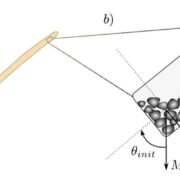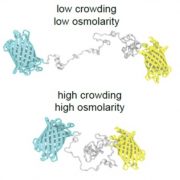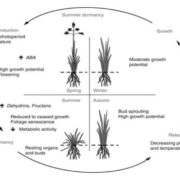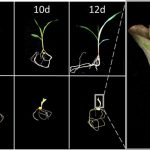High productivity in hybrid-poplar plantations without isoprene emission to the atmosphere ($) (PNAS)
 Many trees emit isoprene (C5H8, a small volatile carbon compound) during hot weather, and isoprenes have been shown to help trees tolerate short bursts of high temperatures (heat flecks). Isoprenes are not themselves harmful, but are reactive and can lead to the production of high levels of ground-level ozone, which is harmful to humans and other plants. Monson et al. used genetic engineering to block isoprene production in hybrid-poplar (a plantation tree used for biofuel and biomass). The authors grew unmodified trees, trees carrying an empty vector, and several independent RNAi insertions over several years in Oregon (mild) and Arizona (hot). Overall, they found no significant reduction in biomass in the isoprene-reduced trees as compared to the empty-vector engineered trees (the untransformed control showed some higher growth effects, particularly during the hottest month of the growing season). The authors observe that much of the biomass accumulations occurs before the hottest temperatures, and also that suppression of isoprene biosynthesis suppresses much of the phenylpropanoid pathway, which could shift metabolism towards lignin biosynthesis. This work demonstrates that decreasing isoprene emissions is not incompatible with high tree productivity. (Summary by Mary Williams) Proc. Natl. Acad. Sci. USA 10.1073/pnas.1912327117
Many trees emit isoprene (C5H8, a small volatile carbon compound) during hot weather, and isoprenes have been shown to help trees tolerate short bursts of high temperatures (heat flecks). Isoprenes are not themselves harmful, but are reactive and can lead to the production of high levels of ground-level ozone, which is harmful to humans and other plants. Monson et al. used genetic engineering to block isoprene production in hybrid-poplar (a plantation tree used for biofuel and biomass). The authors grew unmodified trees, trees carrying an empty vector, and several independent RNAi insertions over several years in Oregon (mild) and Arizona (hot). Overall, they found no significant reduction in biomass in the isoprene-reduced trees as compared to the empty-vector engineered trees (the untransformed control showed some higher growth effects, particularly during the hottest month of the growing season). The authors observe that much of the biomass accumulations occurs before the hottest temperatures, and also that suppression of isoprene biosynthesis suppresses much of the phenylpropanoid pathway, which could shift metabolism towards lignin biosynthesis. This work demonstrates that decreasing isoprene emissions is not incompatible with high tree productivity. (Summary by Mary Williams) Proc. Natl. Acad. Sci. USA 10.1073/pnas.1912327117








